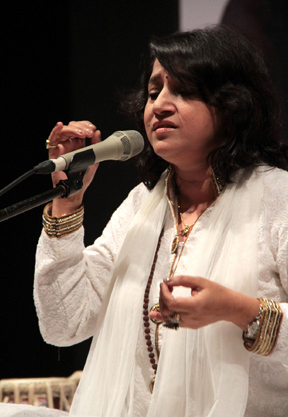 MUMBAI: Singer Kavita Seth says Bollywood has helped Sufi music tremendously, making it a separate genre.
MUMBAI: Singer Kavita Seth says Bollywood has helped Sufi music tremendously, making it a separate genre.
Kavita, who is the voice behind songs like “Iktara” and “Tum Hi Ho Bandhu”, feels Hindi films are nowadays using Sufi music a lot.
“Today there is a lot of exposure of Sufi music in Bollywood. Earlier there was none. Now, we have one sad song, one romantic track, an item number and also a Sufi song in a film which is good. Bollywood has helped Sufi music. It has made it a genre,” Kavita told PTI.
The 45-year-old singer, who made her singing debut with Himesh Reshmiya’s “Vaada”, went on to sing in films like “Gangster”, “Wake up Sid”, “Raajneeti” and “Cocktail”.
On contemporary film music, Kavita believes that songs today lack longer shelf life as the process of composing them has become ‘mechanical’.
“Songs today have a very short shelf life. I believe anything which is made with purity will last long. When music becomes mechanical, like a Xerox machine printing music back to back, that doesn’t work. It has to be a creative process. Let it take all the time in the world, but music is a slow process.”
The singer has recently lent voice for song “Jeetey Hai Chal” from the Sonam Kapoor-starrer “Neerja”.
Kavita says it was the film’s director, Ram Madhvani, who approached her to sing the song.
“I had sung a few songs for Ram when he was making advertisements and he liked my work. When he was making the film, he called me and asked me to sing a song. He showed me the film to get the idea of the situation,” Kavita said.
In her decade-long career, she has mostly worked with two composers – Pritam Chakraborty and Amit Trivedi.
Kavita says both the composers have a distinct style of working, with the former’s forte being melody and the latter’s penchant for experimental music.
“They have very different approach. Amit Trivedi, I feel is an organic composer. He has an experimental music style, he is always in search of different sounds. Pritam’s melody is very strong. You hear it once and it will stay with you, it is addictive.” -PTI






